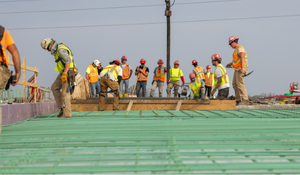(Disclaimer: LIUNA Minnesota and North Dakota is not part of the State of Minnesota, the Minnesota National Guard or the Department of Defense or any of its components and it has no governmental status and no official endorsement is implied. The use of the Minnesota National Guard Armory is solely as a community forum. This event is not sponsored by the Minnesota National Guard or the Department of Defense or any of its components and no endorsement by the Minnesota National Guard or Department of Defense is implied.)
Ensure Public Investments Produce Good, Safe Jobs and Quality Work
Safeguard taxpayer dollars and prevent fraud on publicly funded construction projects by improving the reporting of certified payroll | Support safe workplaces in the construction industry
Fix Minnesota’s Infrastructure and Create Family-Supporting Careers
Invest $250 million to remove dangerous lead pipes in communities throughout the state | Stop cuts to transportation funding and grow dedicated funding for roads and bridges by eliminating the $100 threshold on the road maintenance fee on retail deliveries | Pass a $1 billion local infrastructure jobs bill to fix local roads, bridges, water infrastructure and public buildings
Create Good Jobs for Local Workers and Communities
Lift the nuclear moratorium and stop attacks on natural gas and energy distribution to ensure Minnesota’s transition to 100% clean energy by 2040 | Set the highest bar for labor and environmental protections in the safe and responsible production of critical minerals needed to transition to clean energy and transportation | Advance permitting reforms that ensure timely, reliable and fair review of construction projects that create good jobs and protect our air, water, land and public health
Legislative Updates
Thank You, Governor Walz
FOR IMMEDIATE RELEASEJanuary 5, 2025 Saint Paul, MN – LIUNA Minnesota, representing 14,000 skilled construction and general Laborers across the state, today responded to Governor Tim Walz’s decision...
Read this article hereLIUNA Minnesota Endorses Governor Tim Walz for Reelection
Saint Paul, MN – LIUNA Minnesota, representing 14,000 skilled construction and general Laborers across the state, today announced its endorsement of Governor Tim Walz for reelection. "For six of the...
Read this article hereWe’ve Got Your Back - Under the Hard Hat Too
September 4, 2025By Joel Smith, President and Business Manager of LIUNA Minnesota and North Dakota This September marks National Suicide Prevention Month — a time when our entire country focuses on...
Read this article hereMinnesota's Infrastructure Union Celebrates Passage of Bipartisan Construction Jobs Bill and Pro-Worker Priorities
Saint Paul, MN – Today, Joel Smith, President and Business Manager of LIUNA Minnesota and North Dakota released the following statement after the Minnesota Legislature passed a local infrastructure...
Read this article here








